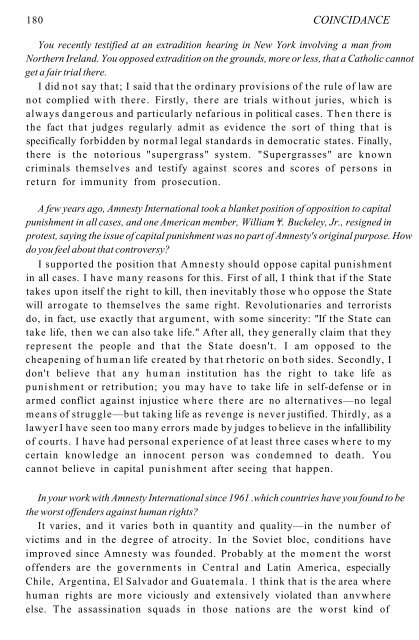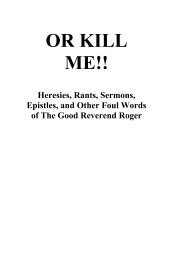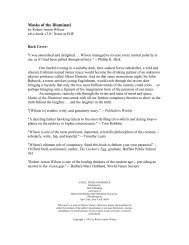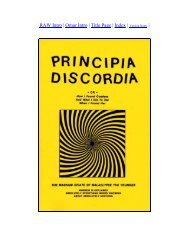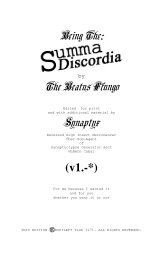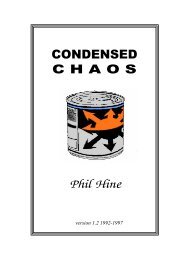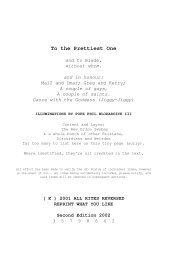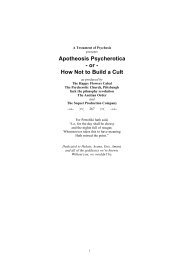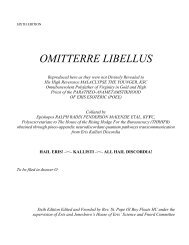Coincidance - Principia Discordia
Coincidance - Principia Discordia
Coincidance - Principia Discordia
Create successful ePaper yourself
Turn your PDF publications into a flip-book with our unique Google optimized e-Paper software.
180 COINCIDANCE<br />
You recently testified at an extradition hearing in New York involving a man from<br />
Northern Ireland. You opposed extradition on the grounds, more or less, that a Catholic cannot<br />
get a fair trial there.<br />
I did not say that; I said that the ordinary provisions of the rule of law are<br />
not complied with there. Firstly, there are trials without juries, which is<br />
always dangerous and particularly nefarious in political cases. Then there is<br />
the fact that judges regularly admit as evidence the sort of thing that is<br />
specifically forbidden by normal legal standards in democratic states. Finally,<br />
there is the notorious "supergrass" system. "Supergrasses" are known<br />
criminals themselves and testify against scores and scores of persons in<br />
return for immunity from prosecution.<br />
A few years ago, Amnesty International took a blanket position of opposition to capital<br />
punishment in all cases, and one American member, William ¥. Buckeley, Jr., resigned in<br />
protest, saying the issue of capital punishment was no part of Amnesty's original purpose. How<br />
do you feel about that controversy?<br />
I supported the position that Amnesty should oppose capital punishment<br />
in all cases. I have many reasons for this. First of all, I think that if the State<br />
takes upon itself the right to kill, then inevitably those who oppose the State<br />
will arrogate to themselves the same right. Revolutionaries and terrorists<br />
do, in fact, use exactly that argument, with some sincerity: "If the State can<br />
take life, then we can also take life." After all, they generally claim that they<br />
represent the people and that the State doesn't. I am opposed to the<br />
cheapening of human life created by that rhetoric on both sides. Secondly, I<br />
don't believe that any human institution has the right to take life as<br />
punishment or retribution; you may have to take life in self-defense or in<br />
armed conflict against injustice where there are no alternatives—no legal<br />
means of struggle—but taking life as revenge is never justified. Thirdly, as a<br />
lawyer I have seen too many errors made by judges to believe in the infallibility<br />
of courts. I have had personal experience of at least three cases where to my<br />
certain knowledge an innocent person was condemned to death. You<br />
cannot believe in capital punishment after seeing that happen.<br />
In your work with Amnesty International since 1961 .which countries have you found to be<br />
the worst offenders against human rights?<br />
It varies, and it varies both in quantity and quality—in the number of<br />
victims and in the degree of atrocity. In the Soviet bloc, conditions have<br />
improved since Amnesty was founded. Probably at the moment the worst<br />
offenders are the governments in Central and Latin America, especially<br />
Chile, Argentina, El Salvador and Guatemala. 1 think that is the area where<br />
human rights are more viciously and extensively violated than anvwhere<br />
else. The assassination squads in those nations are the worst kind of


